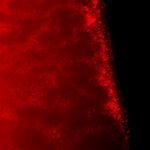Link to Pubmed [PMID] – 26018728
J. Cell. Biochem. 2015 Dec;116(12):2915-23
Mesenchymal stem cells (MSCs) are population of adult stem cells and attractive candidates for cartilage repair due to their chondrogenic potential. Purinergic compounds (purinergic receptors and ecto-enzymes metabolizing nucleotides), together with nucleotides/nucleosides present in the extracellular environment, are known to play a key role in controlling the stem cells biological potential to proliferate and differentiate. Despite the available literature pointing to the importance of purinergic signaling in controlling the fate of MSCs, the research results linking nucleotides and ecto-nucleotidases with MSCs chondrogenic differentiation are indigent. Therefore, the aim of presented study was the characterization of the ecto-nucleotides hydrolysis profile and ecto-enzymes expression in human umbilical cord-derived MSCs and chondrogenically induced MSCs. We described substantial changes of ecto-nucleotides metabolism and ecto-enzymes expression profiles resulting from chondrogenic differentiation of human umbilical cord-derived MSCs. The increased rate of ADP hydrolysis, measured by ecto-nucleotidases activity, plays a pivotal role in the regulation of cartilage formation and resorption. Despite the increased level of NTPDase1 and NTPDase3 mRNA expression in chondrogenically induced MSCs, their activity toward ATP remains quite low. Supported by the literature data, we hypothesize that structure-function relationships in chondrogenic lineage dictate the direction of nucleotides metabolism. In early neocartilage tissue, the beneficial role of ATP in improving biomechanical properties of cartilage does not necessitate the high rate of enzymatic ATP degradation.

